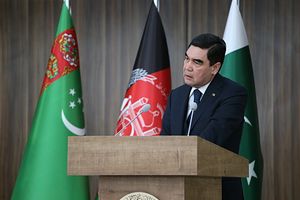As noted yesterday, Turkmenistan’s President Gurbanguly Berdimuhamedov is skipping the gathering of regional leaders in Astana later this week. If not in Astana — meeting with the presidents of Kazakhstan, Kyrgyzstan, Tajikistan and Uzbekistan — then where in the world is Berdy? And why is he missing an opportunity to meet with his regional counterparts in a format that doesn’t come with the kinds of strings or expectations neutral Turkmenistan shies away from?
When news first broke that Berdimuhamedov was sending a delegation, and not himself, to Astana, RFE/RL’s Qishloq Ovozi ran a piece attempting to analyze why. With little information to work with — because it’s Turkmenistan after all — the article rightly pointed to the country’s isolationist tendencies, but also outlined why it would be a good idea for Berdimuhamedov to attend. Ashgabat would be interested in discussions about completing Line D of the Central Asia-China pipeline as well as talk of the Afghan problem.
The article points to reports indicating a food crisis in Turkmenistan — long lines at stores, flour shortages, and small-scale protest actions — as indication that “Turkmenistan’s economic crisis seems to be approaching a breaking point.”
Uzbek President Shavkat Mirziyoyev — the catalyst for this meeting — made his first official trip abroad to Ashgabat in March 2017. Furthermore, Turkmenistan has benefitted from Mirziyoyev’s regional cooperation push, as RFE/RL pointed out Turkmenistan has renewed electricity exports to Uzbekistan and Tajikistan. Given that Turkmenistan’s economy is heavily reliant on its gas exports to China, any diversification of income is good news. But Ashgabat has a one-track mind, that is, one focused on the Turkmenistan-Afghanistan-Pakistan-India (TAPI) pipeline.
So, where is Berdy? On March 13, he touched down in Kuwait for a state visit and he’s scheduled to head to the United Arab Emirates (UAE) next.
According to the Kuwait News Agency (KUNA), Kuwait and Turkmenistan settled a number of key deals at a ceremony attended by the Turkmen president and Kuwaiti Amir, Sheikh Sabah Al Ahmad Al Jaber Al Sabah, as well as the crown prince and prime minister. Among the deals were an agreement to form a joint committee on cooperation and a bilateral visa exemption for diplomatic, service and special passport holders, as well as a memorandum of understanding (MoU) to hold regular discussions. An MoU was signed with the Kuwait Fund for Arab Economic Development (KFAED) and another between Kuwait Petroleum Corporation and Turkmengaz, as well as an agreement on economic cooperation and a trade deal between the two governments. KFAED also settled a “technical assistance document” with the Turkmen government.
The point of listing all that out is this: Berdimuhamedov went to the Gulf rather than Astana for economic reasons. Nothing happening in Kazakhstan this week can be more important than Turkmenistan getting access to more funds to actually make the TAPI pipeline a reality.
Repeated inaugural ceremonies and groundbreaking festivities aside, Turkmenistan is holding the bag on financing most of the TAPI project. Turkmenistan is responsible for 85 percent of the pipeline construction costs, with Afghanistan, Pakistan and India responsible for 5 percent each. With cost estimated at $10 billion, Ashgabat has struggled to arrange funding — in part because of the country’s desire to dominate the details of the project. The Asian Development Bank (ADB), which served as a transaction advisor for the project from 2013 but shied away from financing until its advisory role was ended, finally agreeing to loan $1 billion in late 2016. Also in 2016, the Saudi Arabia-based Islamic Development Bank promised a loan of $700 million. In January 2017, Turkmenistan established a company to finance the project and allocated $2 billion from the government.
Turkmenistan surely hopes for more from from the ADB, but it would necessitate opening the project up to other shareholders. In November 2017, the ADB endorsed a five-year Country Partnership Strategy (CPS) for Turkmenistan with the press release stating that “Going forward, ADB will continue to support the [TAPI] project, including the possibility of providing financial advice, financing shareholder equity in TAPI pipeline company, and non-sovereign loans, and credit enhancement.”
Without more details, it’s all speculation as to whether the Kuwait deals are tied to TAPI directly or just by default — but it seems a reasonable assumption.
After Kuwait, Berdimuhamedov will stop in the UAE. The UAE is home to Dragon Oil, which is one of the few foreign companies to operate in Turkmenistan. Dragon Oil has operated off the Turkmen coast in the Caspian Sea since 2000. Back in 2015, there was a bit of excitement regarding negotiations between Dragon Oil and Ashgabat for the UAE company to get involved in TAPI, but not much has been said of it since.
Berdimuhamedov’s Gulf trip — whatever the aims and outcomes — was likely judged more important than a jaunt to Astana for a regional get-together.

































